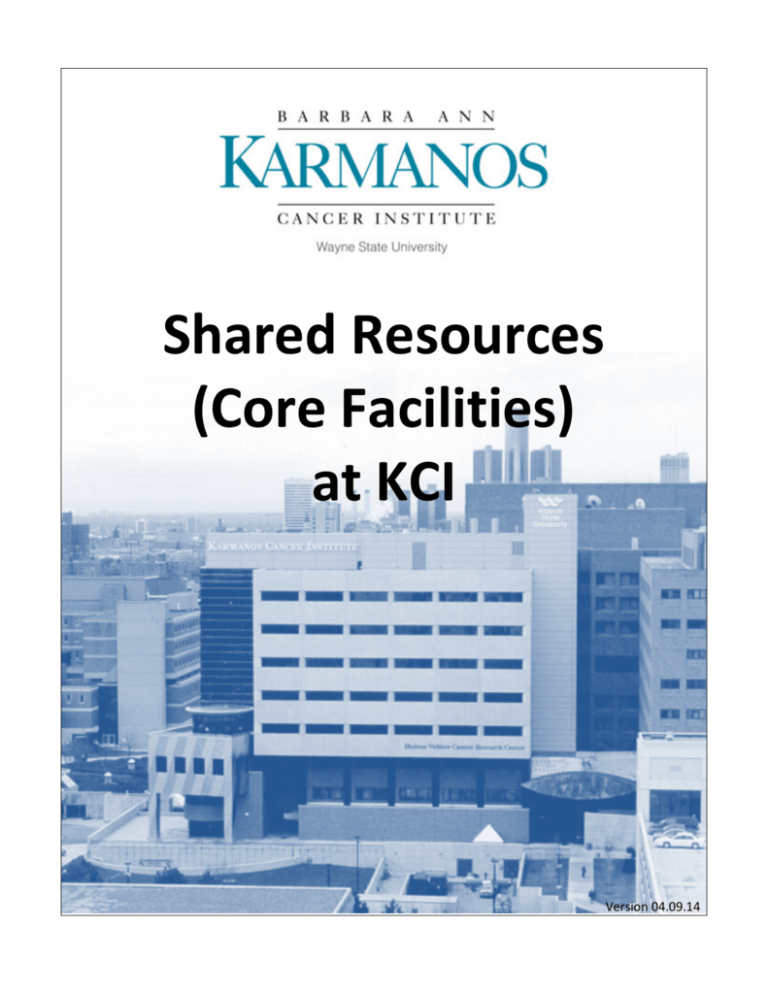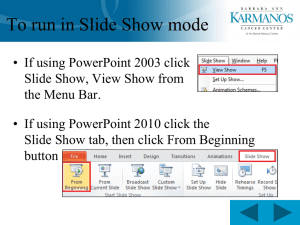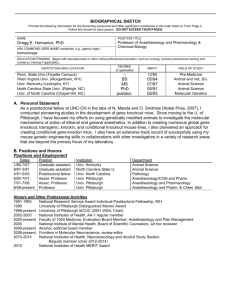the KCI Core Handbook
advertisement

Shared Resources (Core Facilities) at KCI Version 04.09.14 SHARED RESOURCES (COREs) and NIH PUBLIC ACCESS The Shared Resources (Cores) at Karmanos Cancer Institute (KCI) at Wayne State University provide access to specialized technologies, services, and expertise that enhance scientific interaction and productivity. Theses Cores are supported, in part, through a NIH/NCI Cancer Center Support Grant (CCSG), P30 CA022453 (PI: Bepler). As such, any peer-reviewed manuscript which includes results from these Cores must adhere to the NIH Public Access Policy, which states: The NIH Public Access Policy (http://publicaccess.nih.gov/) applies to ANY manuscript that: o is peer-reviewed o is accepted for publication in a journal on or after April 7, 2008 And arises from: o Any direct funding from an NIH grant or cooperative agreement active in Fiscal Year 2008 or beyond, or; o Any direct funding from an NIH contract signed on or after April 7, 2008, or; o Any direct funding from the NIH Intramural Program, or; o An NIH employee. Compliance is evidenced by the presence of a PubMed Central ID (PMCID) number. You are required to provide the PMCID number when citing your papers in biosketches, NIH applications, proposals, and reports. Some journals automatically deposit all NIH-funded final published articles in PubMed Central, to be made publicly available within 12 months of publication, without author involvement. Alternatively, articles can be submitted by the author or designee through the NIHMS system (http://nihms.nih.gov/). KCI Research Administration acts as the designee on behalf of KCI members. The NIH Public Access Policy applies to all publications that are funded directly through the P30 Cancer Center Support Grant (CCSG) via CCSG-supported Shared Resources, Developmental Funds or Early Phase Clinical Research Support (EPCRS) funds. Additionally, when a publication results from use of a KCI Shared Resource, it is essential that the CCSG be listed in the funding acknowledgements section of the published article. This helps identify research supported by the NIH. Specifically, “The (Insert Name) Core is supported, in part, by NIH Center grant P30 CA022453 to the Karmanos Cancer Institute at Wayne State University.” Questions? researchadmin@karmanos.org Karmanos Cancer Institute -- Shared Resources (Core Facilities) Index of Shared Resources (Cores) Core Name – Core Director Page Animal Model and Therapeutics Evaluation Core – Lisa Polin, PhD 5 Behavioral and Field Research Core – Lisa Berry-Bobovski, MA 7 Biobanking and Correlative Sciences Core – Julie Boerner, PhD 9 Biostatistics Core – Judith Abrams, PhD 11 Clinical Trials Office – Helen Peck, RN, MA, OCN, CCRP 13 Epidemiology Research Core – Jennifer Beebe-Dimmer, MPH, PhD 15 Genomics Core – Susan Land, PhD 17 Microscopy, Imaging and Cytometry Resources Core – Kamiar Moin, PhD 19 Pharmacology Core – Jing Li, PhD 21 Proteomics Core – Paul Stemmer, PhD 23 Page 3 Karmanos Cancer Institute -- Shared Resources (Core Facilities) Page 4 Karmanos Cancer Institute -- Shared Resources (Core Facilities) Animal Model and Therapeutics Evaluation Core Core Director: Lisa Polin, PhD Telephone: (313) 576-4270 Email: polinl@karmanos.org Web: www.karmanos.org/?id=573&sid=1 Location: Prentis Research Bldg. 2nd Floor 110 E. Warren Detroit, Michigan 48201 Mission of the Core: The mission of the Animal Model and Therapeutics Evaluation Core (AMTEC) is to provide research support through collaboration or fee for service by (1) distributing cancer models developed in KCI, (2) conducting in vivo testing of novel therapeutics, and (3) assisting investigators in all aspects of small animal research. AMTEC interfaces with appropriate cores for follow-up sample analysis. Core Services Available: Cancer Models Developed in KCI o Provide KCI and external investigators with mouse cell lines, in vivo outgrowth and related biological samples. o BALB/c mammary tumor panels with defined in vivo growth properties, MMTV induced tumor panel 66, 67, 68H, 168, 4.10, 4T07, Hormone induced tumor panel – D2.1, D2A1, D2F2 o Carcinogen induced mouse tumor models with defined in vivo drug sensitivity profiles – mammary, colon and pancreatic lines o Coordinate with Translational Research Core to provide xenografts of primary tumors and human cell lines such as MCF7, MCF10 series and MCF12 series in vivo Testing of Novel Therapeutics o Pre-clinical testing of experimental therapeutics o Generate documents for publication, grant/contract application and intellectual property application o Generate new drug resistant or genetically targeted tumor lines o Generate new xenograft models from human tissues Assist Investigators in All Aspects of Small Animal Research o Preparation of Animal Investigation Protocols for WSU, Funding Agencies and Regulatory Agencies o Breeding and genotyping of genetically modified animals o Small animal whole body Irradiation, surgery, tissue collection, assistance with in vivo imaging o Train lab personnel for specialized techniques o Provide consultation to generate genetically modified mouse strains Resources: In addition to the cell lines and tumor models listed above, the AMTEC resources include cell culture-associated equipment (4 C02 incubators, BSL2 laminar flow hood, inverted microscope, table top centrifuge and autoclave, refrigerator and -20 freezer, (2) -80 Ultracold freezers and (6) LN2 dewars for archival storage purposes). In vivo associated resources include (drug preparation: (3) analytical balances, drill press, homogenizers, filters, ph meters, refrigerator and (3) -20 freezers dedicated to archival drug and sample storage; surgical instrument and associated equipment, Alzet pumps & (3) customized Harvard pumps for infusion studies, trochars, punches, clips, ID equipment, etc. AMTEC has ready access to all (11) WSU DLAR animal facilities and within KCI-Prentis Page 5 Karmanos Cancer Institute -- Shared Resources (Core Facilities) itself: (2) dedicated holding rooms and (3) procedure rooms (with expansion as needed). Also within this facility, is a Coldstream In-Vivo MS FX Pro imager for x-ray, fluorescent and luminescent imaging of study animals, for collaborative studies with the MICR core. Acknowledgement Text: Publications that result from Core involvement should include following statement: The Animal Model and Therapeutics Evaluation Core is supported, in part, by NIH Center grant P30 CA022453 to the Karmanos Cancer Institute at Wayne State University. Selected Publications: Cherian C, Kugel Desmoulin S, Wang L, Polin L, White K, Kushner J, Stout M, Hou Z, Gangjee A, Matherly LH. Therapeutic targeting malignant mesothelioma with a novel 6-substituted pyrrolo[2,3-d]pyrimidine thienoyl antifolate via its selective uptake by the proton-coupled folate transporter. Cancer Chemother Pharmacol 2013; 71:999-1011. PMCID: PMC3749077 Desmoulin SK, Wang L, Polin L, White K, Kushner J, Stout M, Hou Z, Cherian C, Gangjee A, Matherly LH. Functional Loss of the Reduced Folate Carrier Enhances the Antitumor Activities of Novel Antifolates with Selective Uptake by the Proton-coupled Folate Transporter. Mol Pharmacol 2012; 82:591-600. PMCID: PMC3463226 Haagenson KK, Tait L, Wang J, Shekhar MP, Polin L, Chen W, Wu GS. Cullin-3 protein expression levels correlate with breast cancer progression. Cancer Biol Ther 2012; 13:1042-6. PMCID: PMC3461811 Puliyappadamba VT, Wu W, Bevis D, Zhang L, Polin L, Kilkuskie R, Finley RL, Larsen SD, Levi E, Miller FR, Wali A, Rishi AK. Antagonists of anaphase promoting complex (APC)-2-cell cycle and apoptosis regulatory protein (CARP)-1 interaction are novel regulators of cell growth and apoptosis. J Biol Chem 2011; 286:38000-17. PMCID: PMC3207393 Yang H, Wang Y, Cheryan VT, Wu W, Cui CQ, Polin LA, Pass HI, Dou QP, Rishi AK, Wali A. Withaferin a inhibits the proteasome activity in mesothelioma in vitro and in vivo. PLoS One 2012; 7:e41214. PMCID: PMC3422308 Pricing and Scheduling: Please contact Core Director, Dr. Lisa Polin for information relating the latest pricing and scheduling of services – the set rate for technical services is $50.83/hr. Additional Contact Information: Lisa Polin, PhD Director 313.578.4270 polinl@karmanos.org Kathryn White Core staff 313.578-4271 whitek@karmanos.org Page 6 Juiwanna Kushner Core staff 313.578-4271 kushnerj@karmanos.org Karmanos Cancer Institute -- Shared Resources (Core Facilities) Behavioral and Field Research Core Core Director: Lisa Berry-Bobovski, MA Telephone: (313) 576-8289 Email: berryl@karmanos.org Web: www.karmanos.org/?id=574&sid=1 Location: MidMed Research Bldg. MM03BF 87 E. Canfield Detroit, Michigan 48201 Mission of the Core: The Behavioral and Field Research Core (BFRC) is designed to facilitate the integration of communication and behavioral research across KCI’s Programs, including studies involving epidemiology, cancer prevention, clinical and developmental therapeutics, palliative care, and genetics. The Core translates research findings from the behavioral sciences into formats that are useful to investigators trying to understand the impact of human behavior on the clinical or research problem at hand. Core Services Available: Project Design Consultation o expertise in designing research protocols for studies involving behavioral aspects of cancer health disparities; behavioral and communication theory; social network methods and analysis, social marketing approaches and strategies for behavior change; social network analysis and community based participatory research methods o expert consultation for behavioral IRB issues o training for junior investigators utilizing data archives (Medical Interaction Research Archives) o expertise in developing and maintaining community partnerships o health education program design and evaluation Project Management o oversight of behavioral and communication research studies by highly skilled and experienced Core staff, such as quality of life data collection, all video capture studies, and community-based studies Operations o recruitment and retention of study participants (from clinical- and community-based research sites) through maintenance of a community participant registry that includes more than 1,000 names and contact information of persons who are willing to be contacted for possible research participation o novel approaches to dissemination of research findings through Community Advisory Committee members and the community-based organizations represented o video recording of clinical interactions at the KCI outpatient clinics, Children’s Hospital of Michigan and the University Family Physicians Clinic in Detroit including editing, transcription and coding services for video- and audio-recorded data o access to unique video and linked survey data archive (Medical Interaction Research Archive) o access to standardized social/behavioral survey instruments and to national datasets (e.g., HINTS, UM/ ISR Health and Retirement Survey) o focus group facilitation Page 7 Karmanos Cancer Institute -- Shared Resources (Core Facilities) Resources: Resources available through the BFRC include real-time video recording and coding of clinical interactions, access to an extensive video archive for communication and behavioral studies, patient and community research participant registries, as well as an extensive bank of clinical and social/behavioral instruments and measures, and access to comprehensive national datasets (e.g., HINTS), geographical and population tracking/mapping capabilities. Acknowledgement Text: Publications that result from Core involvement should include following statement: The Behavioral and Field Research Core is supported, in part, by NIH Center grant P30 CA022453 to the Karmanos Cancer Institute at Wayne State University. Selected Publications: Eggly S, Penner LA, Hagiwara N, Gonzalez R, Harper FW, Heath EI, Albrecht TL. Patient, companion, and oncologist agreement regarding information discussed during triadic oncology clinical interactions. Psychooncology 2013; 22:637-45. PMCID: PMC3772532 Hagiwara N, Penner LA, Gonzalez R, Eggly S, Dovidio JF, Gaertner SL, West T, Albrecht TL. Racial attitudes, physician-patient talk time ratio, and adherence in racially discordant medical interactions. Soc Sci Med 2013; 87:123-31. PMCID: PMC3677202 Harper FW, Penner LA, Peterson A, Albrecht TL, Taub J. Children's Positive Dispositional Attributes, Parents' Empathic Responses, and Children's Responses to Painful Pediatric Oncology Treatment Procedures. J Psychosoc Oncol 2012; 30:593-613. PMCID: PMC3445040 Henry SG, Eggly S. How much time do low-income patients and primary care physicians actually spend discussing pain? A direct observation study. J Gen Intern Med 2012; 27:787-93. PMCID: PMC3378744 Eggly S, Harper FW, Penner LA, Gleason MJ, Foster T, Albrecht TL. Variation in question asking during cancer clinical interactions: A potential source of disparities in access to information. Patient Educ Couns 2011; 82:63-8. PMCID: PMC2943537 Manning MA, Duric N, Littrup P, Bey-Knight L, Penner L, Albrecht TL. Knowledge of Breast Density and Awareness of Related Breast Cancer Risk. J Cancer Educ 2013; 28:270-4. PMCID: PMC3794460 Meert KL, Eggly S, Berger J, Zimmerman J, Anand KJ, Newth CJ, Harrison R, Carcillo J, Dean JM, Willson DF, Nicholson C. Physicians' experiences and perspectives regarding follow-up meetings with parents after a child's death in the pediatric intensive care unit. Pediatr Crit Care Med 2011; 12:e64-8. PMCID: PMC3327296 Pricing and Scheduling: Please contact the BFRC Core for information relating the latest pricing and scheduling of services. Additional Contact Information: Lisa Berry-Bobovski Director 313. 576.8289 berryl@karmanos.org Tanina Foster Manager 313. 576.8295 fostert@karmanos.org Page 8 Karmanos Cancer Institute -- Shared Resources (Core Facilities) Biobanking and Correlative Sciences Core Core Director: Julie Boerner, Ph.D. Telephone: (313) 576-8351 Email: boernerj@karmanos.org Web: www.karmanos.org/?id=575&sid=1 Location: 816 HWCRC 4100 John R Detroit, Michigan 48201 Mission of the Core: The objectives of the Biobanking and Correlative Sciences (BCS) Core are to make available our expertise in the development and implementation of preclinical studies available to investigators, to facilitate the translation of novel therapeutics from bench to beside, and to perform pharmacodynamic endpoint studies for clinical trials. Additionally, the BCS will provide an organized, central biorepository of a diverse selection of high-quality human tissue specimens such as fresh, frozen, and paraffin embedded tissues that meet the best practices of the NCI for quality biospecimens for cancer research. Core Services Available: o o o o o o o o o o Sample Acquisition, Banking & Distribution Consultation on experimental design Validation and development of cell lines Protein expression and activation assays (Westerns, immunofluorescence, proximity ligation assays) Standard viability drug treatment assays (MTT, CyQuant, synergy analysis) Cell survival and tumorigenesis assays (clonogenics, soft agars) Detection of proteins in tissues (Westerns, immunohistochemistry) Isolation and enumeration of circulating tumor cells Preparation and processing of human tumor tissue and animal xenograft tissues for histology, including, embedding, cryostat and microtome sectioning, conventional staining, immunohistochemistry, whole mount preparations. Distribution of shRNA clones Resources: The BCS employs the following resources and instrumentation to provide quality services to KCI investigators and its affiliates: o o o o o o o o o o o Patient consenting for pathology surgical specimens Procurement of fresh, frozen and paraffin embedded human tissue Storage of procured tissues in -80oC freezers Pathologic verification and diagnosis of tissue Maintenance of inventory of pathologic specimens Johnson & Johnson Veridex Cell Search system Leica DM5500B microscopy Fotodyne imaging system Gel Count colony analysis Bio-Rad and Invitrogen SDS-PAGE systems Pelco Biowave, a state-of-the-art microwave-based histochemistry workstation Page 9 Karmanos Cancer Institute -- Shared Resources (Core Facilities) o o Reichert-Jung 2040 Autocut Microtome, Microm Hm 505E Cryostat, Fisher 166MP Automated Tissue Processor, Shannon Cytospin 2 Centrifuge The OpenBiosystems (Thermo-Fisher) human GIPZ lentiviral shRNA library (maintained in E.coli), comprised of ~ 130,000 individual RNAi vectors that include 3-5 clones targeted for each human gene. Acknowledgement Text: Publications that result from Core involvement should include following statement: The Biobanking and Correlative Sciences Core is supported, in part, by NIH Center grant P30 CA022453 to the Karmanos Cancer Institute at Wayne State University. Selected Publications: Ahmad A, Aboukameel A, Kong D, Wang Z, Sethi S, Chen W, Raz A, Sarkar FH. Phosphoglucose Isomerase/Autocrine Motility Factor mediates epithelial-mesenchymal transition regulated by miR-200 in breast cancer cells. Cancer Res 2011; 71:3400-9. PMCID: PMC3085607 Kong D, Heath E, Chen W, Cher M, Powell I, Heilbrun L, Li Y, Ali S, Sethi S, Hassan O, Hwang C, Gupta N, Chitale D, Sakr WA, Menon M, Sarkar FH. Epigenetic silencing of miR-34a in human prostate cancer cells and tumor tissue specimens can be reversed by BR-DIM treatment. Am J Transl Res 2012; 4:14-23. PMCID: PMC3275434 Sethi S, Kong D, Land SJ, Dyson G, Sakr WA, Sarkar FH. Comprehensive molecular oncogenomic profiling and miRNA analysis of prostate cancer. Am J Transl Res 2013; 5:200-11. PMCID: PMC3612515 Sethi S, Geng L, Shidham VB, Archuletta P, Bandyophadhyay S, Feng J, Madan S, Shi D, Tranchida P, Giorgadze T. Dual color multiplex TTF-1 + Napsin A and p63 + CK5 immunostaining for subcategorizing of poorly differentiated pulmonary non-small carcinomas into adenocarcinoma and squamous cell carcinoma in fine needle aspiration specimens. Cytojournal 2012; 9:10. PMCID: PMC3347720 Wang G, Liu G, Wang X, Sethi S, Ali-Fehmi R, Abrams J, Zheng Z, Zhang K, Ethier S, Yang ZQ. ERLIN2 promotes breast cancer cell survival by modulating endoplasmic reticulum stress pathways. BMC Cancer 2012;12:225. PMCID: PMC3732090 Pricing and Scheduling: Please contact the Core for latest information onr pricing and scheduling. Additional Contact Information: Julie Boerner, PhD Director 313.576.8351 boernerj@karmanos.org Kelly Mueller Manager 313.576.8350 griffink@karmanos.org Page 10 Karri Stark Technician and CTC expert 313.576.8248 starkka@karmanos.org Karmanos Cancer Institute -- Shared Resources (Core Facilities) Biostatistics Core Core Director: Judith Abrams, Ph.D. Telephone: (313) 576-8651 Email: abramsj@karmanos.org Web: www.karmanos.org/?id=576&sid=1 Location: MidMed Research Bldg. MM03BI 87 E. Canfield Detroit, Michigan 48201 Mission of the Core: The Biostatistics Core is a resource for KCI members in basic (in vitro and in vivo), clinical, population and translational sciences. Biostatistics is important in the design of cancer research studies to ensure that the scientific questions are framed so that they can be answered precisely and efficiently. Biostatistics is important in the analysis of these studies to ensure that the conclusions are accurate and valid. Core Services Available: The work of the Core falls into four major categories: 1) development of grant proposals for peer reviewed, external funding, 2) design and protocol development of investigator-initiated clinical trials, 3) analysis of pilot studies, and 4) statistical analysis of data for publication. Specifically, members of the Core: o Develop experimental designs for clinical, laboratory, intervention, and observational studies o Conduct statistical analyses and collaborate on interpretation of results o Write statistical reports and make statistical presentations o Write statistical sections for grant proposals and manuscripts in collaboration with investigators o Provide instruction in biostatistics to cancer researchers in journal clubs, seminar series and grand rounds presentations o Evaluate new and conventional statistical methodology for applicability to cancer research projects and for application or adaptation of methods as required. Resources: Statistical applications include general-purpose software R, SAS and Stata/MP. statistical power includes PASS and nQuery Advisor. Software for calculating Most of the application software resides on aDell Poweredge 2950 III, which has two quad core Intel Xeon 5460 3.16 MHz processors, each with 2x6 MB cache,32 GB memory and two 300 GB disk drives. Computationally intense work is done on our other server, a Dell R820 with 4 Xeon E5-4650 2.70GHz processors, each with 8 cores, 128 GB memory 4 600 GB and 2 146 GB disk drives. Windows server 2008 x64 is the operating system for both machines; the application server software is Citrix XenAp. The back-up unit is a 4 DAT drive running Veritas Backup Exec. Incremental back-up of data files is performed nightly. Full back-ups are performed weekly and the data tapes are maintained off-site in a secure, fireproof storage facility. Access to the server is restricted to members of the Biostatistics Core and authorized guests. Integrated into the WSU high-performance grid computing facility are two PowerEdge R710 computers, each with 48 GB RAM; dual 6 core Intel Xeon X5680 3.33 GHz processors and 1 TB hard drives that run under the Linux operating system. The computers were purchased by KCI for the use of Core members, but are accessible to other authorized KCI members whose research requires high performance computing capabilities. Page 11 Karmanos Cancer Institute -- Shared Resources (Core Facilities) Acknowledgement Text: Publications that result from Core involvement should include following statement: The Biostatistics Core is supported, in part, by NIH Center grant P30 CA022453 to the Karmanos Cancer Institute at Wayne State University. Selected Publications: Abidi MH, Agarwal R, Tageja N, Ayash L, Deol A, Al-Kadhimi Z, Abrams J, Cronin S, Ventimiglia M, Lum L, Ratanatharathorn V, Zonder J, Uberti J. A Phase I Dose-Escalation Trial of High-Dose Melphalan with Palifermin for Cytoprotection Followed by Autologous Stem Cell Transplantation for Multiple Myeloma (MM) Patients with Normal Renal Function. Biol Blood Marrow Transplant 2013; 19:56-61. PMCID: PMC3786738 Balan V, Wang Y, Nangia-Makker P, Kho D, Bajaj M, Smith D, Heilbrun L, Raz A, Heath E. Galectin-3: a possible complementary marker to the PSA blood test. Oncotarget 2013; 4:542-9. PMCID: PMC3720602 Chen W, Ghosh D, Raghunathan TE, Norkin M, Sargent DJ, Bepler G. On Bayesian methods of exploring qualitative interactions for targeted treatment. Stat Med 2012; 31:3693-707. PMCID: PMC3528020 Kim S, Zhang X. Comparative analysis of mass spectral similarity measures on peak alignment for comprehensive two-dimensional gas chromatography mass spectrometry. Comput Math Methods Med 2013;2013 PMCID: PMC3787630 Kaplun L, Fridman AL, Chen W, Levin NK, Ahsan S, Petrucelli N, Barrick JL, Gold R, Land SJ, Simon MS, Morris RT, Munkarah AR, Tainsky MA. Variants in the Signaling Protein TSAd are Associated with Susceptibility to Ovarian Cancer in BRCA1/2 Negative High Risk Families. Biomark Insights 2012; 7:151-7. PMCID: PMC3528110 Kong D, Heath E, Chen W, Cher M, Powell I, Heilbrun L, Li Y, Ali S, Sethi S, Hassan O, Hwang C, Gupta N, Chitale D, Sakr WA, Menon M, Sarkar FH. Epigenetic silencing of miR-34a in human prostate cancer cells and tumor tissue specimens can be reversed by BR-DIM treatment. Am J Transl Res 2012; 4:14-23. PMCID: PMC3275434 Li Y, Kong D, Ahmad A, Bao B, Dyson G, Sarkar FH. Epigenetic deregulation of miR-29a and miR-1256 by isoflavone contributes to the inhibition of prostate cancer cell growth and invasion. Epigenetics 2012; 7:940-9. PMCID: PMC3427289 Price M, Heilbrun L, Kessel D. Effects of the Oxygenation level on Formation of Different Reactive Oxygen Species During Photodynamic Therapy. Photochem Photobiol 2013; 89:683-6. PMCID: PMC3604127 Pricing and Scheduling: Please contact the Biostatistics Core for information relating the latest pricing and scheduling of services. Additional Contact Information: Judith Abrams, PhD Director 313.576.8651 abramsj@karmanos.org Lance Heilbrun, PhD Assistant Director 313.576.8652 heilbrun@karmanos.org Wei Chen, PhD Greg Dyson, PhD Biostatistician 313.576.8655 chenw@karmanos.org Biostatistician 313.576.8654 dysong@karmanos.org Page 12 Seongho Kim, PhD Biostatistician 313.576.8653 kimse@karmanos.org Karmanos Cancer Institute -- Shared Resources (Core Facilities) Clinical Trials Office Executive Director: Helen Peck, RN, MA, OCN, CCRP Telephone: (313) 576-9388 Email: peckh@karmanos.org Web: www.karmanos.org/?id=577&sid=1 Location: MidMed Research Bldg. 3rd Floor 87 E. Canfield Detroit, Michigan 48201 Mission of the Core: The mission of the Clinical Trials Office Core (CTO) is to provide outstanding support to clinical trials at the Karmanos Cancer Institute (KCI) with the goal of improving cancer therapy and patient quality of life through research. Goals and Services Available: o o o o Ensure that all clinical trials conducted at KCI are managed in strict compliance with the Code of Federal Regulations (CFR) and in accordance with International Conference on Harmonization (ICH) Good Clinical Practice (GCP) guidelines. Coordinating and managing all clinical trials conducted at KCI and affiliates in strict compliance with the CFR, ICH GCP standards and internal policy and regulations Ensuring the safety of patients participating in clinical trials Coordinating and tracking National Cancer Institute registrations and annual updates for KCI investigators Coordinating registration and maintenance of all therapeutic clinical trials to ClinicalTrials.gov and the NCI’s Clinical Trials Reporting Program (CTRP) Facilitate and optimize accrual to clinical trials by providing well qualified, specifically trained data management and research nurse support to KCI physicians and clinical support staff. Facilitating increasing accrual to clinical trials Maintaining protocol registry and accrual data utilizing OnCore® Ensure research coordination by facilitating and optimizing physician-patient-CTO staff interaction, communication and collaboration. Increasing awareness and education of all KCI and affiliate institution staff in the clinical trials arena Providing high quality research coordination and data management to KCI, affiliate institutions and external institutions participating in KCI investigator-initiated clinical trials Facilitate regulatory approval and oversight to rapidly review and activate appropriate trials. Serving as an interface with the Institutional Review Board (IRB) Wayne State University Human Investigation Committee (WSU HIC) and NCI Central IRB to facilitate preparation of the required consent and HIPAA forms and other regulatory documents necessary to expedite effective and timely approval of KCI protocols Resources: All staff members of the CTO have access to information systems/databases to facilitate communication and to ensure easy access to patient information and protocol required source documentation. Cerner’s Citrix (CIS) provides password-protected access to medical records including physician dictations, scheduling, and laboratory, imaging, and pathology results. The Chemotherapy Delivery Database provides password-protected access to patient chemotherapy history for source documentation and verification of eligibility. In addition to Page 13 Karmanos Cancer Institute -- Shared Resources (Core Facilities) these databases, the CTO uses OnCore® to manage clinical trials. OnCore® is a highly secure, web-based, cancerspecific system providing fully integrated clinical trials data management and study administration capabilities. Acknowledgement Text: Publications that result from Core involvement should include following statement: The KCI Clinical Trials Office is supported, in part, by NIH Center grant P30 CA022453 to the Karmanos Cancer Institute at Wayne State University. Selected Publications: Abidi MH, Agarwal R, Tageja N, Ayash L, Deol A, Al-Kadhimi Z, Abrams J, Cronin S, Ventimiglia M, Lum L, Ratanatharathorn V, Zonder J, Uberti J. A Phase I Dose-Escalation Trial of High-Dose Melphalan with Palifermin for Cytoprotection Followed by Autologous Stem Cell Transplantation for Multiple Myeloma (MM) Patients with Normal Renal Function. Biol Blood Marrow Transplant 2013; 19:56-61. PMCID: PMC3786738 Abidi MH, Tageja N, Ayash L, Abrams J, Ratanatharathorn V, Al-Kadhimi Z, Lum L, Cronin S, Ventimiglia M, Uberti J. Aprepitant for prevention of nausea and vomiting secondary to high-dose cyclophosphamide administered to patients undergoing autologous peripheral blood stem cells mobilization: a phase II trial. Support Care Cancer 2012; 20:2363-9. PMCID: PMC3594089 Kafri Z, Heilbrun LK, Sukari A, Yoo G, Jacobs J, Lin HS, Mulrenan H, Smith D, Kucuk O. Phase II Study of Gemcitabine and Docetaxel Combination in Patients with Previously Treated Recurrent or Metastatic Squamous Cell Carcinoma of the Head and Neck. ISRN Oncol 2012; 2012:159568. PMCID: PMC3359684 Lum LG, Thakur A, Liu Q, Deol A, Al-Kadhimi Z, Ayash L, Abidi MH, Pray C, Tomaszewski EN, Steele PA, Schalk DL, Yano H, Mitchell A, Dufresne M, Uberti JP, Ratanatharathorn V. CD20-Targeted T cells after Stem Cell Transplant for High Risk and Refractory Non-Hodgkin's Lymphoma. Biol Blood Marrow Transplant 2013; 19:925-33. PMCID: PMC3794673 Ogita S, Tejwani S, Heilbrun L, Fontana J, Heath E, Freeman S, Smith D, Baranowski K, Vaishampayan U. Pilot Phase II Trial of Bevacizumab Monotherapy in Nonmetastatic Castrate-Resistant Prostate Cancer. ISRN Oncol 2012; 2012:242850. PMCID: PMC3382396 Pricing and Scheduling: Please contact the Clinical Trials Office for information relating the latest pricing and scheduling of services. Additional Information: “CTO Handbook for Investigators” on the CTO webpage: https://research1.karmanos.org/research/Home2/ClinicalTrials2.aspx Additional Contact Information: Lawrence Flaherty, MD Medical Director 313.576.8725 flaherty@karmanos.org Helen Peck, RN, MA, OCN, CCRP Executive Director 313.576.9388 peckh@karmanos.org Page 14 Karmanos Cancer Institute -- Shared Resources (Core Facilities) Epidemiology Research Core Core Director: Jennifer Beebe-Dimmer, MPH, Ph.D. Telephone: (313) 578-4209 Email: dimmerj@karmanos.org Web: www.karmanos.org/?id=578&sid=1 Location: MidMed Research Bldg. MM04EP 87 E. Canfield Detroit, Michigan 48201 Mission of the Core: The Epidemiology Research Core (ERC) mission is to support population-based research by accessing metropolitan Detroit cancer cases and cancer registry data for use in approved research. The ERC provides epidemiology expertise and collaborates with researchers conducting investigations in cancer prevention, etiology, treatment and outcomes. This type of population-based cancer research is made possible by ERC accessing this data on behalf of researchers, which ensures confidentiality. Core Services Available: o o o o o o o Consultation. Consultation and collaborative research expertise focused on study design, proposal development, IRB applications, and interpretation of population-based local and national SEER data. Rapid Case Ascertainment. Rapid identification and ascertainment of eligible study participants, requiring review of all pathology reports indicating a cancer diagnosis at approximately 60 metropolitan area hospitals, clinics, pathology laboratories and radiation therapy facilities and rapid collection of patient demographic information. This speeds up case identification for population-based studies, with most cases identified within two to three months of diagnosis. Control Identification. Identification of population-based control groups for case-control study designs via random digit dialing, Centers for Medicaid and Medicare Services (CMS) records, Department of Motor Vehicles (DMV) records, and other mechanisms. Recruitment and Interviewing Support. Oversight and support of study participant recruitment and data collection via telephone, mailed and in-person interviews. Collection and Abstraction of Medical Records. Collection of medical records and abstracting of studyspecific data which are not available in the MDCSS registry. Biospecimen Collection. Collection of biologic specimens, including blood, buccal cells, saliva and tumor blocks, from study participants and/or diagnosing hospitals including KCI and non-KCI facilities. Collection from KCI facilities is coordinated with the Biorepository Core. Database Query. Response to requests for population-based data requiring query of the MDCSS and/or the national SEER Limited-Use data files and SEER-Medicare files for descriptive analyses. Database Linkage. Linkage of outside data sources to MDCSS data for the collection of patient demographics, treatment and survival data. Resources: The MDCSS data system contains all cancer diagnosis and survivorship information for the Metropolitan Detroit area from 1973 forward, housed on the SEER Data Management System (SEER*DMS) Oracle Database System. The SEER*DMS is a browser based application written in Java that interfaces with a PostgreSQL v.9.1 database. SEER*DMS supports central cancer registry operations and includes features for importing, editing, consolidating, exporting, and reporting on cancer-related data. The configuration used at MDCSS is a four Linux server installation: server one contains the application, server two contains the active database, server three is used as the storage appliance, and server four contains the data warehouse. The data warehouse is updated Page 15 Karmanos Cancer Institute -- Shared Resources (Core Facilities) nightly and is a read-only version of the active database. This database currently houses data on in excess of 760,000 patients and 860,000 cancers. Acknowledgement Text: Publications that result from Core involvement should include following statement: The Epidemiology Research Core is supported, in part, by NIH Center grant P30 CA022453 to the Karmanos Cancer Institute at Wayne State University. Selected Publications: Beebe-Dimmer JL, Cetin K, Shahinian V, Morgenstern H, Yee C, Schwartz KL, Acquavella J. Timing of androgen deprivation therapy use and fracture risk among elderly men with prostate cancer in the United States. Pharmacoepidemiol Drug Saf 2012; 21:70-8. PMCID: PMC3313550 Beebe-Dimmer JL, Colt JS, Ruterbusch JJ, Keele GR, Purdue MP, Wacholder S, Graubard BI,Davis F, Chow WH, Schwartz KL. Body Mass Index and Renal Cell Cancer: The Influence of Race and Sex. Epidemiology 2012; 23:8218. PMCID: PMC3466395 Cote ML, Colt JS, Schwartz KL, Wacholder S, Ruterbusch JJ, Davis FG, Purdue MP, Graubard BI, Chow WH. Cigarette smoking and renal cell carcinoma risk among black and white Americans: effect modification by hypertension and obesity. Cancer Epidemiol Biomarkers Prev 2012; 21:770-9. PMCID: PMC3348421 Mina N, Soubani AO, Cote ML, Suwan T, Wenzlaff AS, Jhajhria S, Samarah H, Schwartz AG. The Relationship Between Chronic Obstructive Pulmonary Disease and Lung Cancer in African American Patients. Clin Lung Cancer 2012; 13:149-56. PMCID: PMC3422020 Purdue MP, Hofmann JN, Colt JS, Hoxha M, Ruterbusch JJ, Davis FG, Rothman N, Wacholder S, Schwartz KL, Baccarelli A, Chow WH. A case-control study of peripheral blood mitochondrial DNA copy number and risk of renal cell carcinoma. PLoS One 2012; 7:e43149. PMCID: PMC3427307 Purdue MP, Moore LE, Merino MJ, Boffetta P, Colt JS, Schwartz KL, Bencko V, Davis FG, Graubard BI, Janout V, Ruterbusch JJ, Beebe-Dimmer J, Cote ML, Shuch B, Mates D, Hofmann JN, Foretova L, Rothman N, SzeszeniaDabrowska N, Matveev V, Wacholder S, Zaridze D, Linehan WM, Brennan P, Chow WH. An investigation of risk factors for renal cell carcinoma by histologic subtype in two case-control studies. Int J Cancer 2013; 132:26402647. PMCID: PMC3717609 Pricing and Scheduling: Please contact the Core for latest information on pricing and scheduling of services. Additional Contact Information: Jen Beebe-Dimmer, MPH, PhD Director 313. 578.4209 dimmerj@karmanos.org Fawn Vigneau, JD, MPH Co-Director 313. 578.4231 vigneauf@med.wayne.edu Page 16 Tricia Arballo-Spong Manager 313.578.4235 arballop@med.wayne.edu Karmanos Cancer Institute -- Shared Resources (Core Facilities) Genomics Core Core Director: Susan Land, Ph.D. Telephone: (313) 577-9605 Email: sland@med.wayne.edu Web: www.agtc.wayne.edu www.karmanos.org/?id=579&sid=1 Location: C.S. Mott Center Applied Genomics Technology Center 275 East Hancock Detroit, Michigan 48201 Mission of the Core: The Genomics Core / Applied Genomics Technology Center (AGTC), provides state-of-the-art genomic technologies and expert consultation services. Core scientists interact with researchers at the design phase of projects and assist in incorporating genomics approaches by generating preliminary data, providing methodology descriptions, analyzing cost, and performing high throughput implementation of technology. A genomics analyst group is available to incorporate seamless data management and analysis to genomic data generated by the AGTC. Core Services Available: Core services are divided into three categories: 1) fully established services; 2) fee for service with established prices, which may vary depending on sample type, quantity, and reagent availability, (genotyping); and 3) studies requiring new technology development. Services include: o DNA Isolation o DNA Sequencing o Genotyping Services o Digital PCR o DNA Methylation Studies o RNA Isolation o Expression Analysis o Genomics Data Management and Analysis Instrumentation: o o o o o o o o o o o o o o Qiagen Symphony Qiagen EZ1 Advanced-2 Qiagen TissueLyser Applied Biosystems 3730 Applied Biosystems QuantStudio 12K Flex Real-Time PCR System with robotic stacker Illumina iScan with Tecan freedom evo robot customized to run Illumina protocols and an Illumina AutoLoader Affymetrix GeneChip Scanner 3000 with Autoloader, two GeneChip Fluidics Station 450, GeneChip Hybridization Oven 640, two Affymetrix workstations Agilent 2100 Bioanalyzer Agilent TapeStation NanoDrop ND-1000 Spectrophotometer Trinean DropSense96 Spectrophotometer Eppendorf epMotion 5075-2 pre-PCR units and a post-PCR unit Covaris S2 (adaptive acoustic focused energy for shearing nucleic acid) Illumina HiSeq 2000 (to be upgraded to a 2500 in late 2012) Page 17 Karmanos Cancer Institute -- Shared Resources (Core Facilities) o o o o o o o o o Primary Server for Illumina Pipeline (Dell R910 with 32 cores, 1TB memory, and 10 TB local storage Backup Server for Illumina Pipeline (Dell R900 with 16 cores, 64 GB memory, and 27 TB storage) Failover and Analysis Server (Dell R900 with 16 cores, 256 GB memory, and 8 TB local storage) Testbed Server Dell R900 with 16 cores, 128 GB memory, and 27 TB storage) Sunfire X4500 with 48 TB storage with a second identical unit at WSU C&IT acting as a mirror Sunfire X4540 with 96 TB storage with a second identical unit at WSU C&IT acting as a mirror Illumina Genome Studio-5 licenses Novoalign License Genomatix Acknowledgement Text: Publications that result from Core involvement should include following statement: The Genomics Core is supported, in part, by NIH Center grant P30 CA022453 to the Karmanos Cancer Institute at Wayne State University. Selected Publications: Cingolani P, Patel VM, Coon M, Nguyen T, Land SJ, Ruden DM, Lu X. Using Drosophila melanogaster as a Model for Genotoxic Chemical Mutational Studies with a New Program, SnpSift. Front Genet 2012; 3:35. PMCID: PMC3304048 Li Q, Tainsky MA. Epigenetic Silencing of IRF7 and/or IRF5 in Lung Cancer Cells Leads to Increased Sensitivity to Oncolytic Viruses. PLoS One 2011; 6:e28683. PMCID: PMC3237484 Schwartz AG, Wenzlaff AS, Bock CH, Ruterbusch JJ, Chen W, Cote ML, Artis A, Van Dyke AL, Land S, Harris CC, Pine S, Spitz M, Amos CI, Levin AM, McKeigue P. Admixture Mapping of Lung Cancer in 1,812 African Americans. Carcinogenesis 2011; 32:312-7. PMCID: PMC3047238 Spitz MR, Amos CI, Land SJ, Wu X, Dong Q, Wenzlaff AS, Schwartz AG. Role of Selected Genetic Variants in Lung Cancer Risk in African Americans. J Thorac Oncol 2013; 8:391-7. PMCID: PMC3623962 Sun D, Tainsky MA, Haddad R. Oncogene Mutation Survey in MPNST Cell Lines Enhances the Dominant Role of Hyperactive Ras in NF1 Associated Pro-Survival and Malignancy. Transl Oncogenomics 2012; 5:1-7. PMCID: PMC3273949 Pricing and Scheduling: Please visit http://www.agtc.wayne.edu for information relating the latest pricing and scheduling of services. Additional Contact Information: Susan J. Land, Ph.D. Director sland@med.wayne.edu 313.577.9605 Aliccia Bollig-Fischer, Ph.D. Associate Director bollig@karmanos.org 313.577.8671 Page 18 Karmanos Cancer Institute -- Shared Resources (Core Facilities) Microscopy, Imaging and Cytometry Resources Core Core Director: Kamiar Moin, Ph.D. Telephone: (313) 577-2199 Email: kmoin@med.wayne.edu Web: www.med.wayne.edu/micr www.karmanos.org/?id=580&sid=1 Location: Scott Hall Suite 6339 540 E. Canfield Detroit, Michigan 48201 Mission of the Core: The mission of the Microscopy, Imaging & Cytometry Resources (MICR) core is to enhance the peer reviewed funded research activities of WSU investigators whose research requires microscopy, imaging resources, flow cytometry, histology and related techniques. Core Services Available: o o o o o o o o o o o o o o o o Confocal Microscopy, including both point scanning (Zeiss LSM 510, Zeiss LSM 310, Leica TCS SP5) and spinning disk (Perkin Elmer UltraVIEW) technologies Multiphoton Microscopy, including Second Harmonic Generation imaging Fluorescent Microscopy Conventional, widefield epifluorescence Optical sectioning using Structured Illumination (via the Zeiss ApoTome system) In vivo small animal imaging In vivo small animal Positron Emission Tomography (PET) imaging In vivo small animal X-Ray, white light, fluorescence and bioluminescence imaging Long-term, live cell imaging. Advanced Image Analysis, including 3D and 4D image reconstruction and quantitative measurements Preparation and processing of animal and xenograft tissues for histology, including, embedding, cryostat and microtome sectioning, conventional staining, immunohistochemistry, whole mount preparations. Cell analysis for data acquired using the benchtop cytometers and the FACSDiVa. Cell sorting (operator driven), using the FACSDiVa. The DiVa sorts up to 20,000 cells/second. Cytometry Data analysis, Expert consultation, including advice on the choice of application and experimental design Training and on site support for use of equipment Instrumentation: o o o o o o o o o o o Imaging Zeiss LSM-780 Laser Scanning Confocal Microscope Zeiss LSM-510 META NLO Laser Scanning Confocal Microscope with Multiphoton capability Leica TCS SP5 MP Laser Scanning Confocal Microscope with Multiphoton capability Perkin Elmer UltraView ERS Confocal Microscope based on spinning disk technology Zeiss LSM-410 Laser Scanning Confocal Microscope Zeiss ApoTome Live Cell Imaging Zeiss Axiophot upright fluorescent photomicroscope Bruker In Vivo Extreme small animal multimodal optical and X-ray imager Bruker MSFS Pro small animal multimodal optical and X-ray imager MicroPET R4 scanner (Concorde Microsystems, Inc.) Siemens Inveon small animal SPECT/CT small animal imager Page 19 Karmanos Cancer Institute -- Shared Resources (Core Facilities) o o o o o o o Molecular Imaging Portal (MIP), a high capacity image server module. In-house cell culture facility and animal holding facility Cytometry LSRII, a benchtop machine equipped with three lasers operating at 488nm (blue), 405nm (violet) and 633nm (red). The present machine has eight-color capability. FACSCanto, a benchtop machine equipped with two lasers operating at 488nm (blue), and 633nm (red). The FACSCanto has six-color capability. FACSDiVa, sorter, equipped with three lasers, 488 nm, multiline UV (351-364 nm) and krypton capable of UV and red multiline excitation. Histology Pelco Biowave, a state-of-the-art microwave-based histochemistry workstation Reichert-Jung 2040 Autocut Microtome, Microm Hm 505E Cryostat, Fisher 166MP Automated Tissue Processor, Shannon Cytospin 2 Centrifuge Acknowledgement Text: Publications that result from Core involvement should include following statement: The Microscopy, Imaging and Cytometry Resources Core is supported, in part, by NIH Center grant P30 CA022453 to the Karmanos Cancer Institute at Wayne State University.” Selected Publications: Braun RD, Bissig D, North R, Vistisen KS, Berkowitz BA. Human tumor cell proliferation evaluated using manganese-enhanced MRI. PLoS One 2012; 7:e30572. PMCID: PMC3281834 Hou Z, Desmoulin SK, Etnyre E, Olive M, Hsiung B, Cherian C, Wloszczynski PA, Moin K, Matherly LH. Identification and functional impact of homo-oligomers of the human proton-coupled folate transporter. J Biol Chem 2012; 287:4982-95. PMCID: PMC3281668 Kaur H, Mao S, Shah S, Gorski DH, Krawetz SA, Sloane BF, Mattingly RR. Next-generation sequencing: a powerful tool for the discovery of molecular markers in breast ductal carcinoma in situ. Expert Rev Mol Diagn 2013; 13:151-65. PMCID: PMC3804339 Rothberg JM, Sameni M, Moin K, Sloane BF. Live-cell imaging of tumor proteolysis: Impact of cellular and noncellular microenvironment. Biochim Biophys Acta 2012; 1824:123-32. PMCID: PMC3232330 Shekhar MP, Kato I, Nangia-Makker P, Tait L. Comedo-DCIS is a precursor lesion for basal-like breast carcinoma: identification of a novel p63/Her2/neu expressing subgroup. Oncotarget 2013;4:231-41. PMCID: PMC3712569 Zuo J, Bi C, Fan Y, Buac D, Nardon C, Daniel KG, Dou QP. Cellular and computational studies of proteasome inhibition and apoptosis induction in human cancer cells by amino acid Schiff base-copper complexes. J Inorg Biochem 2013; 118:83-93. PMCID: PMC3676669 Pricing and Scheduling: Please visit the MICR website for information relating the latest pricing and scheduling of services. Additional Contact Information: Kamiar Moin, Ph.D. Director 313.577.2199 kmoin@med.wayne.edu Jessica Back, Ph.D. Associate Director 313.576.8341 backj@karmanos.org Page 20 MICR Lab 313.577.2511 Karmanos Cancer Institute -- Shared Resources (Core Facilities) Pharmacology Core Core Director: Jing Li, Ph.D. Telephone: (313) 576-8258 Email: lijin@karmanos.org Web: www.karmanos.org/?id=581&sid=1 Location: Hudson-Webber Cancer Research Bldg. Suite 523 4100 John R. Detroit, Michigan 48201 Mission of the Core: The Pharmacology Core was established in 1999 to provide state-of-the-art technology and expertise in bioanalysis, pharmacokinetics (PK), and pharmacogenetics (PG) for evaluation of critical pharmacological endpoints in preclinical and early phase clinical studies. Core Services Available: o o o o o Pharmacokinetic/Pharmacodynamic (PK/PD) Specimen Processing and Distribution Service providing support for clinical trials, including specimen transport, accountability, processing, storage, and distribution, in compliance with applicable Core Standard Operating Procedures (SOPs), IRB-approved protocols, and regulatory requirements. LC-MS/MS, HPLC Bioanalysis Service providing quantitative measurement of drugs and metabolites in biological specimens (e.g., blood, plasma, serum, urine, or tissue samples) using high performance liquid chromatography (HPLC) coupled with ultraviolet detector, fluorescence detector, or tandem mass spectrometer (LC-MS/MS). Bioanalytical Methods Development and Validation Service provides for the development and validation of analytical methods (i.e., HPLC and LC-MS/MS method) that are used for quantitative measurement of drugs and their metabolites (analytes) in a given biological matrix (e.g., blood, plasma, serum, urine, or tissues Pharmacokinetic (PK) Data Analysis and Modeling Service provides: 1) assistance in preclinical and clinical pharmacokinetic experimental design and protocol development, and 2) analysis and interpretation of PK data using traditional or population PK modeling approaches. Pharmacogenetic (PG) Analysis Service focuses on employing a candidate gene approach to examine the associations between common single nucleotide polymorphisms (SNPs) of selected genes (such as genes encoding drug metabolizing enzymes, transporters, or target receptors/enzymes) and the PK parameters, PD effects, or clinical outcome (efficacy or toxicity) of clinical investigational anticancer agents. Instrumentation: Major instruments for PK/PD sample processing and storage include: o Beckman GS-15R Centrifuges o Revco -300C and -800C freezers with liquid nitrogen: o Both Revco freezers have alarms and temperature chart recorders for the proper documentation of storage conditions. Page 21 Karmanos Cancer Institute -- Shared Resources (Core Facilities) Major instruments for the Bioanalysis Service include: o Waters LC-MS/MS system: Controlled by MassLynx software, consisting of a Waters 2695 HPLC pump, autosampler, UV detector, temperature control module, and Waters Quattro MicroTM tandem triple quadrupole mass spectrometer with ES and APCI ionization. o Waters HPLC system with photodiode array detection: Controlled by Empower software, consisting of a Waters 600 HPLC Pump, Waters 996 photodiode array (PDA) detector, Waters Pump Control Module, BioRad AS-100 autosamplers, and Waters Temperature Control Module. o Shimadzu HPLC system with photodiode array and fluorescence detection: Controlled by EZSTART V7.4 software, consisting of SHIMADZU SCL-10Avp controller, LC-10ADvp pump, DUG-20A3 degasser, SIL10ADvp autosampler, CTO-20A column oven, FRC-10A fraction collector, RF-10AXL fluorescence detector, and SPD-M20A photodiode array (PDA) detector. Software for PK data analysis includes: o WinNonlin version 5.0 (Pharsight Corp., Mountain View, CA) o NONMEM version 6 (ICON Development Solutions, Ellicot City, MD) Acknowledgement Text: Publications that result from Core involvement should include following statement: The Pharmacology Core is supported, in part, by NIH Center grant P30 CA022453 to the Karmanos Cancer Institute at Wayne State University.” Selected Publications: Margolin KA, Moon J, Flaherty LE, Lao CD, Akerley WL, Othus M, Sosman JA, Kirkwood JM, Sondak VK. Randomized phase II trial of sorafenib with temsirolimus or tipifarnib in untreated metastatic melanoma (S0438). Clin Cancer Res 2012; 18:1129-37. PMCID: PMC3481165 Heath EI, Blumenschein GR, Cohen RB, LoRusso PM, Loconte NK, Kim ST, Ruiz-Garcia A, Chao RC, Wilding G. Sunitinib in combination with paclitaxel plus carboplatin in patients with advanced solid tumors: phase I study results. Cancer Chemother Pharmacol 2011; 68:703-12. PMCID: PMC3400085 Wu J, Matherly L, LoRusso P, Li J. Implications of plasma protein binding for pharmacokinetics and pharmacodynamics of the γ-secretase inhibitor RO4929097. Clin Cancer Res. 2012; 18: 2066-79. PMCID: PMC3856649 Wu J, Wiegand R, LoRusso P, Li J. Validation and implementation of a liquidchromatography/tandem mass spectrometry assay for quantitation of the total and unbound RO4929097, a gamma-secretase inhibitor targeting Notch signaling, in human plasma. J Chromatogr B Analyt Technol Biomed Life Sci 2011; 879:1537-43. PMCID: PMC3771103 Pricing and Scheduling: Please contact the Core for latest information on pricing and scheduling. Additional Contact Information: Jing Li, Ph.D. Director 313.576.8258 lijin@karmanos.org Richard Wiegand, MS, Che Manager 313.576.8244 wiegandr@karmanos.org Page 22 Karmanos Cancer Institute -- Shared Resources (Core Facilities) Proteomics Core Core Director: Paul Stemmer, Ph.D. Telephone: (313) 577-6536 Email: pmstemmer@wayne.edu Web: proteomics.wayne.edu www.karmanos.org/?id=582&sid=1 Location: Scott Hall Suite 2105 540 E. Canfield Detroit, Michigan 48201 Mission of the Core: The mission of the Proteomics Core is to enhance research productivity of WSU/KCI researchers by providing the equipment and expertise necessary for analysis of cellular protein composition and protein-protein interactions. These two objectives require different instrumentation, but they both rely on expertise in protein chemistry, separation and analysis. Core Services Available: o o o o o o o o o o o o o Protein identification using nano-LC/MS/MS or MALDI ToF MS instruments Protein quantitation using spectral counting or isobaric tags with data acquired on the LTQ and the Multiple Reaction Monitoring strategy using the TSQ Vantage system Proteomic profiling using two-dimensional chromatographic separations or MuDPIT technologies Analysis of post translational modifications using nano-LC/MS/MS with fragmentation by ETD or CID Robotic protein digestion using the Genomic Solutions Investigator ProGest Robotic MALDI plate spotting using the Genomic Solutions Investigator ProMS Sample fractionation by liquid phase isoelectric focusing using the BD Free Flow Electrophoresis, the Invitrogen Zoom isoelectric focusing apparatus or the Cell Biosciences digital Protein Fractionator Two-dimensional chromatographic separation of cell and tissue lysates and biological fluid samples using the Beckman/Coulter PF2D. MultiView software on an off-line work station allows visualization of differences in protein composition between samples. Fractionated samples are collected in 96 well plates for further analysis. Protein interaction and protease activity analysis by fluorescence polarization measurement using the Beacon 2000 fluorescence polarization system or the Tecan Polarion microplate reader Peptide labeling and purification using an HPLC with UV and Fluorescence Detectors Fluorescence measurement using a QM-6 spectrofluorometer equipped for simultaneous dual emission recording and with removable dual emission polarizers all controlled by software on an accompanying work station Surface Plasmon Resonance (SPR) using a Biacore 3000. Investigators performing SPR analysis must have appropriately trained personnel Data Analysis using Mascot, Sequest, X!tandem and Peaks algorithms with data compilation and secondary analysis using Scaffold. Instrumentation: o o o o o Thermo Finnigan LTQ-XL Linear Ion Trap nano-LC/MS/MS with ETD Thermo Finnigan TSQ Vantage triple quadrupol nano-LC/MS/MS Applied Biosystems DE-Pro MALDI ToF mass spectrometer Genomic Solutions Investigator ProGest robot Genomic Solutions Investigator ProMS robot Page 23 Karmanos Cancer Institute -- Shared Resources (Core Facilities) o o o o o o Beckman Coulter PF-2D (2005) Proteomic profiling instrumentation for two-dimensional chromatographic separation of cell and tissue lysates and biological fluid samples. BD Free Flow Electrophoresis Beacon 2000 - Fluorescence polarization system and Tecan Polarion microplate reader. HPLC system for peptide purification, which includes UV and Fluorescence Detectors Photon Technologies QM-6 spectrofluorometer Biacore 3000 Acknowledgement Text: Publications that result from Core involvement should include following statement: The Proteomics Core is supported, in part, by NIH Center grant P30 CA022453 to the Karmanos Cancer Institute at Wayne State University. Selected Publications: Deranieh RM, He Q, Caruso JA, Greenberg ML. Phosphorylation Regulates myo-Inositol-3-phosphate Synthase: A novel regulatory mechanism of inositol biosynthesis. J Biol Chem 2013; 288:26822-26833. PMCID: PMC3772229 Kessel D, Price M, Caruso J, Reiners Jr J. Effects of photodynamic therapy on the endocytic pathway. Photochem Photobiol Sci 2011; 10:491-8. PMCID: PMC3069131 Lee DC, Hassan SS, Romero R, Tarca AL, Bhatti G, Gervasi MT, Caruso JA, Stemmer PM, Kim CJ, Hansen LK, Becher N, Uldbjerg N. Protein profiling underscores immunological functions of uterine cervical mucus plug in human pregnancy. J Proteomics 2011; 74:817-28. PMCID: PMC3111960 Reiners JJ, Kleinman M, Kessel D, Mathieu PA, Caruso JA. Non-esterified Cholesterol Content of Lysosomes Modulates Susceptibility to Oxidant-induced Permeabilization. Free Radic Biol Med 2011; 50:281-94. PMCID: PMC3018561 Spain MM, Caruso JA, Swaminathan A, Pile LA. Drosophila SIN3 Isoforms Interact with Distinct Proteins and Have Unique Biological Functions. J Biol Chem 2010; 285:27457-67. PMCID: PMC2930744 Wan J, Subramonian D, Zhang XD. SUMOylation in Control of Accurate Chromosome Segregation during Mitosis. Curr Protein Pept Sci 2012; 13:467-481. PMCID: PMC3474960 Pricing and Scheduling: Please visit http://proteomics.wayne.edu for information relating the latest pricing and scheduling of services. Additional Contact Information: Paul Stemmer, Ph.D. Director 313.577.6536 pmstemmer@wayne.edu Joseph Caruso, Ph.D. Co-Director 313.577.6542 Joseph_caruso@wayne.edu Page 24






